Kagero-za Blu-ray Movie
HomeKagero-za Blu-ray Movie 
Blu-ray + DVD + Digital CopyArrow | 1981 | 140 min | Not rated | No Release Date
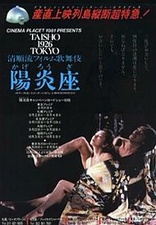
Price
Movie rating
6.6 | / 10 |
Blu-ray rating
| Users | 0.0 | |
| Reviewer | 4.0 | |
| Overall | 4.0 |
Overview
Kagero-za (1981)
The inner workings of the human psyche are featured in this study of relationships between different leading characters. The action weaves around playwright Matsuzaki (Yusaku Matsuda) -- who is sleeping with Shinako (Michio Okusu), a married woman -- and his other "lover," Ine (Eriko Kasuda), a fairly corporeal spirit. The film is set in 1926, when cinema was silent -- and that era is evoked in Kagero-za.
Starring: Yűsaku Matsuda, Michiyo Yasuda, Mariko Kaga, Katsuo Nakamura, Yoshio HaradaDirector: Seijun Suzuki
| Foreign | Uncertain |
| Romance | Uncertain |
| Fantasy | Uncertain |
| Thriller | Uncertain |
Specifications
Video
Video codec: MPEG-4 AVC
Video resolution: 1080p
Aspect ratio: 1.33:1
Original aspect ratio: 1.37:1
Audio
Japanese: LPCM 2.0
Subtitles
English SDH
Discs
Blu-ray Disc
Two-disc set (1 BD, 1 DVD)
Digital copy
DVD copy
Playback
Region A (B, C untested)
Review
Rating summary
| Movie | 4.0 | |
| Video | 4.0 | |
| Audio | 4.0 | |
| Extras | 1.5 | |
| Overall | 4.0 |
Kagero-za Blu-ray Movie Review
Reviewed by Jeffrey Kauffman August 18, 2017Note: This film is available as part of
Seijun Suzuki's The Taisho Trilogy.
Have you ever had a dream where something significant within it changed, and yet the dream and its internal logic seemed to continue unabated?
I’ve had dreams were either I or someone else in the dream changed into someone else, and yet it was always clear who was whom and what was
going on (again within the generally incomprehensible context of some of my dreams). I’m sure many of you have had a similar experience,
maybe where a location in a dream suddenly morphs into someplace else, with no real concern resulting as far as the dreamer’s understanding
goes. If you’re one of those rare people who have never had anything like these experiences, I need only suggest you spend a few minutes with
Seijun Suzuki’s The Taishō Trilogy to get at least a hint of the feeling that ensues when a dream bizarrely transforms and yet just as
bizarrely remains an organic whole unto itself. Suzuki had forged a long if not especially notable career churning out B movies for Nikkatsu,
though his nascent auteur tendencies made him a bit of a persona non grata, ultimately leading to his firing (more or less, anyway) after
Branded to Kill pushed the conservative studio bigwigs too far. A
lawsuit
and then ten years of more or less exile followed for Suzuki, but when he returned with The Taishō Trilogy, it was with those previously
dismissed surreal tendencies not only intact, but arguably reinforced by his trek in the cinematic wilderness. The Taishō Trilogy takes its
name from the Taishō Period in Japanese history, an era which stretched roughly from 1912 to 1926, though all three films in this set,
Zigeunerweisen (1980), Kagero-za (1981) and Yumeji (1991), are so intentionally mythic or at least folkloristic that they
often seemed to be divorced from any specific timeframe — much as with many dreams. Also as with the type of dreams referenced above, all
three films waft in and out of general narrative coherence, with striking shifts in perspective and odd visual and verbal non sequiturs that may
speak directly to the subconscious but which (perhaps unavoidably) present certain obstacles to the rational mind.
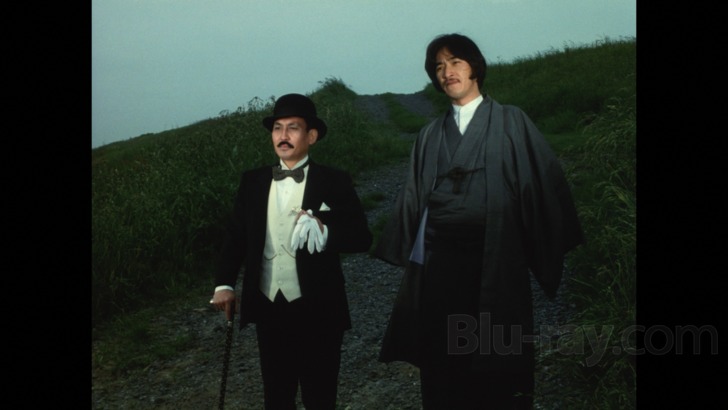
Kagero-za’s title can be translated roughly as “heat haze theater”, and there’s a fever dream aspect to it that is undeniable and often weirdly unforgettable. The film purports to tell the story of a playwright and his patron, with an obsessive love story thrown in, but once again Suzuki’s presentational style is so surreal and hypnotic that any traditional narrative norms are left largely by the wayside. Even “simple” dialogue scenes can, in that dreamlike fashion alluded to above, suddenly change locales, and Suzuki repeatedly utilizes his camera to either push in past characters or conversely track out past them to reveal strange new tableaux that give the film an almost ritualistic aspect, perhaps crossed with just a touch of Kabuki.
Shungo Matsuzaki (Yusaku Matsuda) is a playwright who really doesn’t need to worry about too much courtesy of patronage by the wealthy Tamawaki (Katsuo Nakamura), at least if worry is constrained to financial woes. Matsuzaki is troubled, first generally but then more obsessively sexually, by a woman named Shinako (Michiyo Ookusu), who (it should probably be mentioned) may or may not be a ghost, and the ghost of Tamawaki's wife at that. None of these characters is really granted traditional introductions, and certainly not much in the way of backstory or context, and so, tableau like, they simply appear, often in overtly theatrical framings that promote a certain static quality, even as Suzuki keeps his camera darting to and fro.
This is a film that deals in some provocative material, but which seems strangely removed from its potentially salacious aspects simply because the whole style of the piece is so dreamlike. Characters go through the motions, including the sexual motions, but they almost seem like marionettes controlled by some unseen hands. There’s a perhaps more overtly folkloristic element to this film than the two others in this set, with references to elements like an old woman whose gifts may be the souls of women she’s killed feeling an awful lot like old folk tales. As such, there’s an emotional distance here that keeps things from ever resonating in anything approaching a naturalistic way, something that seems intentional given the highly theatrical presentational style Suzuki favors.
Kagero-za defies rational explanation, and indeed the rational mind itself, which is part and parcel of its peculiar but ineluctable allure. I frankly didn’t understand large swaths of what was going on in this film, but I was never less than completely captivated by its sleepwalking style. Performances are surprisingly low key given some of the florid material, and even simple scenes like Matsuzaki drying Shinako’s long black hair seem positively suffused with subliminal meaning. Like the best (or at least the most memorable) dreams, Kagero-za may not in fact make much sense, at least in the traditional meaning of the term, but it has a powerful impact that is distinctly different from the sort of B-movie grade thrills Suzuki provided in his genre Yakuza efforts for Nikkatsu.
Kagero-za Blu-ray Movie, Video Quality 
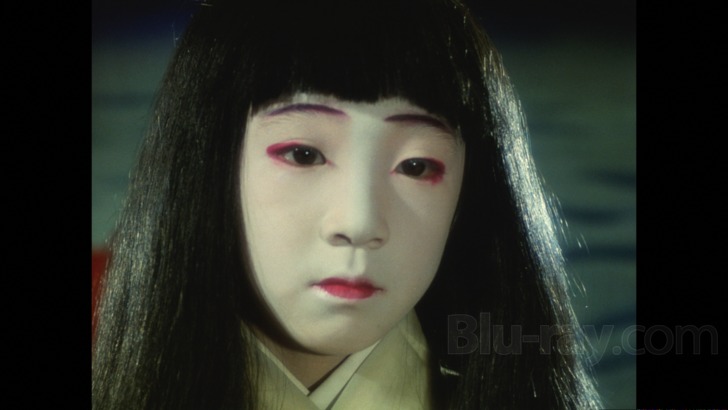
All three of the films in Seijun Suzuki's The Taishō Trilogy are presented on Blu-ray courtesy of Arrow Academy with AVC encoded 1080p transfers. Despite the verbiage reproduced from the insert booklet (below), Zigeunerweisen is in 1:34, Kagero-za is in 1.33:1 and Yumeji is in 1.66:1. While not quite as informative as some Arrow comments about their transfers, the insert booklet for the trilogy contains the following:
The films in The Taishō Trilogy have been restored by Free Stone Productions in Japan using the original film and audio elements. Zeigeunerweisen and Kageroza are presented in their original aspect ratios of 1.37:1. Yumeji is presented in it original aspect ratio of 1.66:1. The films contain their original mono soundtracks.Because all three of these transfer share certain characteristics, I'm going to make some general comments about all of them before moving on to each individual film. While all three boast elements that are either in excellent shape or have been digitally restored to appear so, I personally wished for just a bit more energy in the palette, will all three looking slightly anemic and in some cases skewed toward brown. Grain is very well resolved on all three features and the overall look of the transfers is commendably organic and stable.
Kagero-za has a somewhat better saturated palette than Zigeunerweisen, and instead of looking brown often has a slightly blue cast informing its palette. This transfer has none of the brightness and contrast variability seen in the previous film, however. The outdoor scenes have a good array of hues, if again slightly tamped down looking at times. This film has a lot of dimly lit interior scenes, including some moments that flirt with crush. Once again, fine detail on elements like patterns on fabrics look precise and sharp (see the suit in screenshot 4 for a good example). The film has a couple of special optical effects where grain expectedly spikes for a moment. Elements are largely free of age related wear and tear.
Kagero-za Blu-ray Movie, Audio Quality 
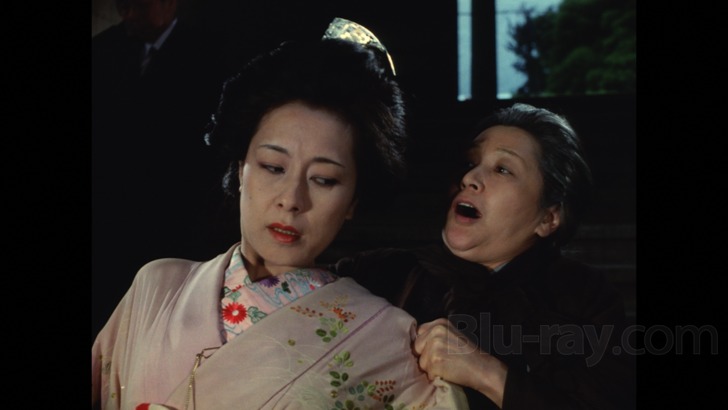
All three films in The Taishō Trilogy sport fine sounding LPCM 2.0 mono tracks in the original Japanese. The films all have rather interesting sound designs, with natural ambient environmental effects merging with sometimes detached feeling dialogue, and with sometimes unusual score choices added into the proceedings as well. All three tracks are unavoidably narrow sounding, but offer fine fidelity and no problems. Occasional "damage" creeps in with regard to things like the archival recording used in Zigeunerweisen.
Kagero-za Blu-ray Movie, Special Features and Extras 
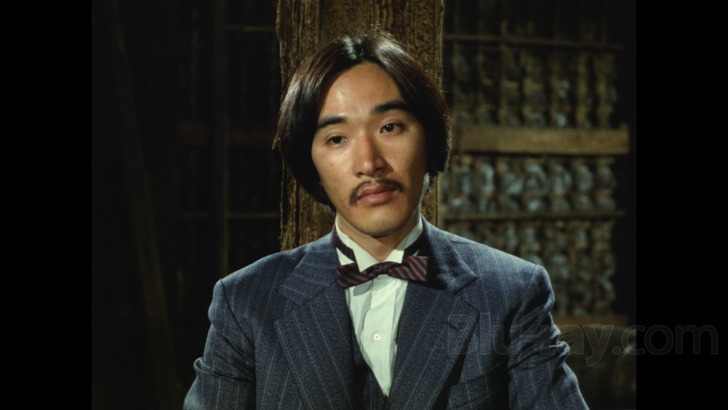
- Introduction by Tony Rayns (1080p; 17:21) talks about the unexpected success of Zigeunerweisen, which led to this almost immediate follow up.
- Interview with Seijun Suzuki (1080i; 25:44) is a good archival piece covering the trilogy. Source video starts out looking a little iffy but is fine if not fantastic. In Japanese with English subtitles.
- Theatrical Trailer (1080p; 2:54)
Kagero-za Blu-ray Movie, Overall Score and Recommendation 
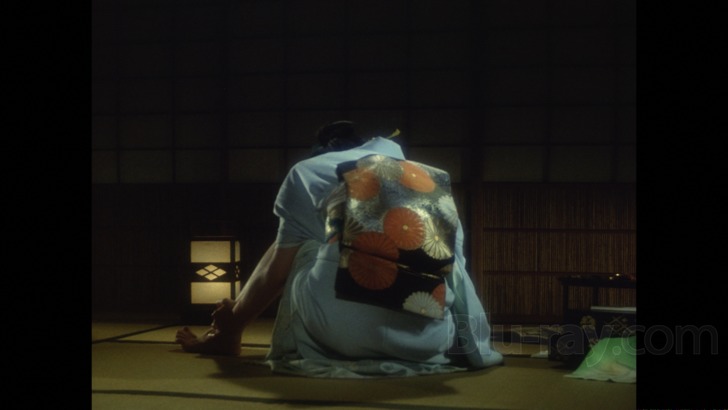
Much like Zigeunerweisen, Kagero-za requires the viewer to simply let go and let Suzuki go where he wills. The film has a somewhat more (ostensibly) logical ambience than the previous film, but only by a matter of degrees. This is another exercise in dreamlike filmmaking that seems to want to subvert the rational mind and appeal to something more atavistic. Kagero-za does offer some of the best stylistic flourishes of the three films in this set, and one way or the other, it's a completely unique and memorable viewing experience. Recommended.
Similar titles
Similar titles you might also like
(Still not reliable for this title)

Zigeunerweisen
1980

Yumeji
1991

Demon Pond 4K
夜叉ヶ池 / Yasha-ga-ike
1979

Spies
Spione
1928

Fando y Lis
Fando and Lis
1968

The Magic Flute
Trollflöjten
1975

Sex Doll
2016

Trans-Europ Express
1967

Weak Spot
La faille | Limited Edition
1975

Goodbye & Amen
L'uomo della CIA | Limited Edition
1977

The Golden Fern
Zlate Kapradi
1963

The Curse of the Yellow Snake
Der Fluch der Gelben Schlange
1963

Creepy
Slipcover in Original Pressing
2016

Videophobia
Slipcover in Original Pressing
2019

Ilya Muromets
The Sword & the Dragon
1956

Stranger
夜のストレンジャー 恐怖 / Yoru no sutorenjā Kyōfu
1991

The Well-Digger's Daughter
La Fille du puisatier
2011

Angel with the Iron Fists
鐵觀音 / Tie guan yin
1967

Little Dragon Maiden
Yang Guo yu Xiao Long Nu / Yeung Goh yue Siu Lung Lui / 楊過與小龍女
1983

La Garce
1984